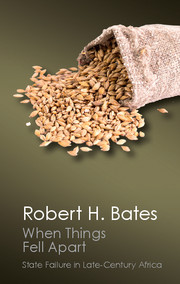3 - Political Legacies
from Part Two - Sowing the Seeds
Published online by Cambridge University Press: 05 October 2015
Summary
By convention, 1960 marks the year of independence in Africa. Shortly after independence, Africa's new states faced two withering critiques, one mounted by Franz Fanon (1963) and a second by Rene Dumont (1962). Although their indictments overlap, Fanon's targeted their politics whereas Dumont's focused on their policies. In this chapter, I analyze the nature of post-independence politics, emphasizing in particular the nature of political institutions. In Chapter 4, I address the policies chosen by Africa's governments in the post-independence era.
As reported in Chapter 2, by the late 1970s, in more than eighty percent of the country years, opposition parties failed to challenge incumbent heads of state, most often because it was illegal for them to do so (Figure 2.4), and in roughly one-third of the country years, military officers served as heads of state (Figure 2.2). The political institutions of post-independence Africa were thus authoritarian. For late-century Africa, the consequence was an increased likelihood of political disorder.
Throughout this chapter, I repeatedly draw illustrations from Zambia's political history. Box 3.1 provides a synopsis, to which the reader may refer while seeking to master the several narratives. Map 3.1 outlines the boundaries of Zambia's provinces, whose political leaders jockeyed for top positions in the ruling party and national government.
The Incumbent's Dilemma
When colonial regimes departed from Africa, they orchestrated their retreat by holding elections and exiting midst the political din. While competitors for office championed the cause of independence and denounced the evils of colonialism, a notable feature of their campaigns was the stress they placed on seizing the “fruits of independence.”
In a careful study of the city of Abidjan, Michael Cohen (1974) explores the use of power in Cote d'Ivoire. Rural backers of the ruling party, he noted, used their political connections to move from provincial towns to the national capital (Cohen1974). Some had been appointed to the boards of state-owned corporations, which produced “palm oil, hardwood, rubber … and construction equipment” (ibid., pp. 24–5).
- Type
- Chapter
- Information
- When Things Fell ApartState Failure in Late-Century Africa, pp. 33 - 54Publisher: Cambridge University PressPrint publication year: 2015



